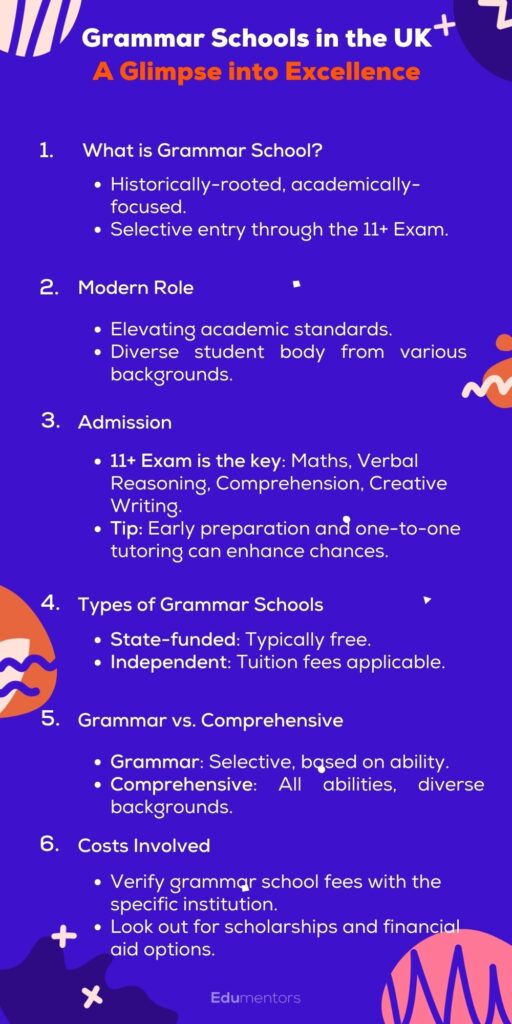The Ultimate Guide to Grammar Schools in the UK
Navigating the UK’s educational system can be a hard task for parents, with its diverse institutions, each offering a different approach to learning. Yet, amidst this variety, grammar schools consistently stand out as a topic of interest and sometimes debate. So, what exactly is a grammar school? And why has it retained such significance in the modern-day UK? For families researching options, understanding grammar schools in UK can be invaluable. For those on the threshold of deciding their child’s academic path or anyone keen on understanding the intricacies of the UK education system, this exploration promises clarity. Let’s dive into the world of grammar schools, uncovering their significance, challenges, and unique attributes in the UK’s educational tapestry.

What is a Grammar School?
Historical Origins of Grammar Schools
Grammar schools trace their roots back to mediaeval times. They were institutions devoted to teaching Latin, which was not just a language but the gateway to higher professions and classical education. These schools were the places where the seeds of future leaders, thinkers, and visionaries were sown.
Modern Definition
Fast forward to today, and the definition has evolved. Now, when someone inquires about “what is a grammar school”, the reply often centres on its nature as a state secondary school that handpicks its pupils based on academic merit, primarily via the 11+ exam.
Why Is It Called a Grammar School?
Delving into the etymology, the term ‘grammar school’ sprouted from its emphasis on teaching grammar, primarily Latin. This focus was deemed foundational for academic and professional pursuits in earlier times.
Understanding the Secondary School System in the UK

Navigating the UK’s secondary school landscape can sometimes feel like traversing a maze. It’s not just about knowing the differences but understanding where each institution fits in the grand tapestry of British education. Here’s a brief overview:
📌 State Schools
These schools are funded by the government and are free for students to attend. They predominantly adhere to the national curriculum guidelines.
📌 Comprehensive Schools
These institutions offer an inclusive environment, catering to students of various abilities and backgrounds. Originating as a response to grammar schools that selected only high-performing students, comprehensive schools embrace all, typically under the governance of local authorities.
📌 Faith Schools
Dedicated to specific religious beliefs, faith schools receive state funding but primarily serve students from specific denominations, such as Catholic or Jewish traditions. While they may integrate religious teachings, they largely stick to the national curriculum.
📌 Academies and Free Schools
These schools receive direct government funding but enjoy greater autonomy in their curriculum and operations compared to traditional state schools. They also hold discretion in student selection.
📌 Independent Schools
Often referred to as private schools, these institutions operate without government or local authority funding. Parents bear the tuition costs, and the schools have the liberty to create their distinct admission tests.
It’s vital to recognise that while each school type has its ethos and methodology, what’s paramount is finding the right fit for the student. Given the varied offerings in the UK’s educational system, parents and guardians have a plethora of options to explore and decide which institution aligns best with their child’s aspirations and needs.
Admission to Grammar Schools
For parents new to the process, the looming question is: “how to apply for the grammar school test?” In most instances, applications can be submitted online, either via the local council or the school’s website. Equally crucial is discerning “when the grammar school test” takes place in your locality to align preparations accordingly.
One option is to engage a one-to-one tutor. This can make a considerable difference, offering personalised strategies, practice sessions, and boosting your child’s confidence. It’s highly recommended to use Edumentors platform. It is an online tutoring platform that can help you find a qualified tutor who can help your child prepare for the 11+ Exam. Edumentors tutors are experienced and knowledgeable, and they can tailor their teaching to your child’s specific needs.
In essence, while the aspiration to join a grammar school is commendable, it’s essential to be aware of the demands it places on young learners. With the right support and clear insights into the admission process, the journey can be smoother and more rewarding.
How to Determine if Your Child is Suitable for Grammar School
The choice of grammar school isn’t a mere academic decision; it’s an intricate dance of aspirations, abilities, and suitability. One question echoing in many parents’ minds is, “how do I know if my child is suitable for grammar school?”. Answering this involves considering the child’s academic inclinations, the rigours of the 11+ exam, and the competitive nature of admissions. Speaking of competition, many wonder what percentage get into grammar school? While the exact figures can vary, it’s widely accepted that the acceptance rates are competitive. Given the limited seats and the esteemed reputation of these institutions, it’s essential for parents to be pragmatic and informed in their approach.
The 11+ exam is a challenging exam, and it is okay for your child to fail. The average pass rate for the 11+ exam in England is around 25%. This means that 75% of students who take the exam do not pass. There are many factors that can affect a child’s chances of passing the 11+ exam, including their academic ability, their motivation, and their test-taking skills. If your child does not pass the 11+ exam, it is important to be supportive. Help them to understand that failing the exam does not mean that they are not smart or capable. There are many other great schools out there, and your child will still have a bright future.
Top Grammar Schools in the UK

The United Kingdom boasts a rich tapestry of academic institutions, but among them, grammar schools occupy a unique place of reverence and prestige. Parents often find themselves pouring over rankings and reviews, pondering the critical question: “What is the best grammar school in the UK?” The answer, of course, isn’t straightforward; it depends on various factors, including curriculum strength, extracurricular offerings, and pastoral care. Different regions have their own educational strengths, with Manchester’s top grammar schools representing some of the finest options in the North of England.
Historically, grammar schools have been the cornerstone of academic excellence, churning out well-rounded individuals equipped to face the challenges of higher education and the professional world. These schools have upheld their standards, adapting to the evolving educational landscape, ensuring students are prepared not only academically but also holistically. Their alumni often include prominent personalities in fields ranging from politics to arts, testament to the balanced and rigorous education provided.
For parents who consider a grammar school for their child, it’s essential to look beyond just academic rankings. Consider the school’s ethos, its approach to student welfare, the breadth of its extracurricular activities, and the experiences of past students. A school’s reputation is built not only on its exam results but also on the experiences and successes of its students, both within the school walls and beyond.
After extensive research and keeping in mind various parameters, we’ve compiled insights and data to answer the much-debated question. And for those who are keen on specifics and want a curated guide to the crème de la crème, here is the list of the top 10 grammar schools in the UK.
These schools are all highly selective and have a strong academic reputation. They offer a challenging and stimulating education that can prepare students for success at university and beyond.
It is important to note that the rankings of grammar schools can vary depending on the criteria used. The Sunday Times Parent Power rankings are based on a number of factors, including exam results, student satisfaction, and teacher quality.
If you are considering sending your child to a grammar school, it is important to do your research and choose a school that is a good fit for your child’s individual needs and interests.
Grammar School Fees
When it comes to education, money matters. And when it comes to grammar schools, the fees can vary depending on the school.
State-funded grammar schools are free to attend. These schools are funded by the government and do not charge tuition fees. However, they may charge for things like extracurricular activities, lunches, and textbooks.
Independent grammar schools are not funded by the government and do charge tuition fees. These fees can range from £10,000 to £18,000 per year. In addition to tuition fees, independent grammar schools may also charge for things like boarding, uniforms, and other expenses.
So, how do you know how much grammar school fees will cost?
The best way to find out is to contact the school directly. The school will be able to give you an estimate of the fees, as well as any other expenses that may be involved.
It’s also important to remember that there are scholarships available for grammar school students. These scholarships can help to offset the cost of tuition and other expenses.
If you’re considering sending your child to a grammar school, it’s important to factor in the cost of fees. However, it’s also important to remember that the benefits of a grammar school education can be significant. Grammar schools typically have high academic standards and offer a rigorous curriculum. They also have a strong focus on extracurricular activities and provide students with opportunities to develop their talents and skills.
Ultimately, the decision of whether or not to send your child to a grammar school is a personal one. However, it’s important to weigh the costs and benefits carefully before making a decision.
Here are some additional things to keep in mind when considering grammar school fees:
- The fees for boarding schools are typically higher than the fees for day schools.
- The fees for independent grammar schools may increase each year.
- There may be additional expenses, such as transportation and exam fees.
- Some grammar schools offer financial assistance to students who need it.
If you have any questions about grammar school fees, you should contact the school directly. They will be able to give you more specific information about the fees and any financial assistance that may be available.
Conclusion
The tapestry of education is woven with threads of tradition, aspiration, and innovation. Grammar schools in the UK, with their deep historical roots and commitment to academic excellence, stand as luminous threads in this fabric, guiding countless individuals to their brightest futures. For parents, the journey towards finding the ideal educational path for their children is paved with choices and challenges. Yet, understanding the unique value that grammar schools bring, both in terms of academic rigour and holistic development, can inspire a vision of boundless potential.
Edumentors is a leading educational consultancy that can help you navigate the complex world of grammar school admissions. Edumentors can help you find the right 11+ tutors for your child and create a personalised study plan.
The legacy of grammar schools is more than just academic achievement; it’s about nurturing thinkers, leaders, and visionaries equipped to navigate an ever-evolving world. As we stand at the intersection of tradition and the future, let us remember that education is the most powerful instrument for changing the world, as Nelson Mandela once said. Whether it’s the ancient halls of a grammar school or the contemporary classrooms of comprehensive institutions, the ultimate goal remains the same: to empower our children to be the best versions of themselves and to leave indelible marks on the world.
To all parents and guardians, as you weigh your options and envision the futures for your children, know that the commitment to their growth and the desire for their success is the most potent catalyst. May your choices be guided by wisdom, hope, and the unwavering belief in the potential that every child holds within.









